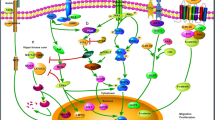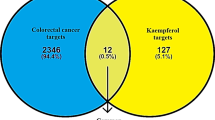Abstract
Colorectal cancer (CRC) is one of the most common malignant gastrointestinal cancers. Metastasis is the major leading cause of death in patients with CRC, and many patients treated with radical surgery were diagnosed with metastasis during follow-up. However, the underlying molecular mechanisms regulating CRC metastasis are still elusive. Sterol o-acyltransferase 1 (SOAT1) is a critical participant in maintaining intracellular cholesterol balance. Here, by analyzing the clinical specimens and in vitro cell line experiments, we evaluated the clinical relevance and role of SOAT1 in regulating CRC metastasis. The results revealed that SOAT1 was overexpressed in colon cancer tissues compared to peritumor tissues at mRNA and protein levels. High intratumor SOAT1 expression correlates to lymph node metastasis and indicates poor patient disease-free survival and overall survival. The silencing of SOAT1 strongly inhibited the migration and invasion ability of CRC tumor cells. These results demonstrated that SOAT1 was upregulated in colon cancer. Upregulation of SOAT1 expression may promote CRC progression by enhancing the migration and invasion ability of CRC. Our results indicate that targeting SOAT1 activity may be applied as a promising therapeutic strategy for preventing the metastasis of CRC after radical surgical treatment.



Similar content being viewed by others
Abbreviations
- SAOT1:
-
Sterol o-acyltransferase 1
- CRC:
-
Colorectal cancer
- ACAT:
-
Acyl-coenzyme A: cholesterol acyltransferase
- DMEM:
-
Dulbecco’s modified Eagle’s medium
- FBS:
-
Fetal bovine serum
- PVDF:
-
Polyvinylidene difluoride membrane
- qRT-PCR:
-
Quantitative real-time PCR
- IHC:
-
Immunohistochemical
- OS:
-
Overall survival
- DFS:
-
Disease-free survival
References
Sung H et al (2021) Global Cancer Statistics 2020: GLOBOCAN estimates of incidence and mortality worldwide for 36 cancers in 185 countries. CA Cancer J Clin 71(3):209–249
Siegel RL et al (2017) Colorectal cancer statistics, 2017. CA Cancer J Clin 67(3):177–193
Mauri G et al (2019) Early-onset colorectal cancer in young individuals. Mol Oncol 13(2):109–131
Connell LC et al (2017) The rising incidence of younger patients with colorectal cancer: questions about screening, biology, and treatment. Curr Treat Options Oncol 18(4):23
Messersmith WA (2017) Systemic management of colorectal cancer. J Natl Compr Canc Netw 15(5S):699–702
Brenner H, Kloor M, Pox CP (2014) Colorectal cancer. Lancet 383(9927):1490–1502
Buccafusca G et al (2019) Early colorectal cancer: diagnosis, treatment and survivorship care. Crit Rev Oncol Hematol 136:20–30
Song D et al (2021) HSP90-dependent PUS7 overexpression facilitates the metastasis of colorectal cancer cells by regulating LASP1 abundance. J Exp Clin Cancer Res 40(1):170
Onal G et al (2017) Lipid droplets in health and disease. Lipids Health Dis 16(1):128
DeBose-Boyd RA (2018) Significance and regulation of lipid metabolism. Semin Cell Dev Biol 81:97
Snaebjornsson MT, Janaki-Raman S, Schulze A (2020) Greasing the wheels of the cancer machine: the role of lipid metabolism in cancer. Cell Metab 31(1):62–76
Corbet C, Feron O (2017) Emerging roles of lipid metabolism in cancer progression. Curr Opin Clin Nutr Metab Care 20(4):254–260
Luo X et al (2017) Emerging roles of lipid metabolism in cancer metastasis. Mol Cancer 16(1):76
Cao Y (2019) Adipocyte and lipid metabolism in cancer drug resistance. J Clin Invest 129(8):3006–3017
Xu H et al (2020) Cholesterol metabolism: new functions and therapeutic approaches in cancer. Biochim Biophys Acta Rev Cancer 1874(1):188394
Mankidy R et al (2010) Membrane plasmalogen composition and cellular cholesterol regulation: a structure activity study. Lipids Health Dis 9:62
Qian H et al (2020) Structural basis for catalysis and substrate specificity of human ACAT1. Nature 581(7808):333–338
Volkmar N et al (2019) The ER membrane protein complex promotes biogenesis of sterol-related enzymes maintaining cholesterol homeostasis. J Cell Sci 132(2)
Yang H et al (1997) Functional expression of a cDNA to human acyl-coenzyme A:cholesterol acyltransferase in yeast. Species-dependent substrate specificity and inhibitor sensitivity. J Biol Chem 272(7):3980–3985
Guo ZY et al (2005) The active site His-460 of human acyl-coenzyme A:cholesterol acyltransferase 1 resides in a hitherto undisclosed transmembrane domain. J Biol Chem 280(45):37814–37826
An S et al (2006) A critical role for the histidine residues in the catalytic function of acyl-CoA:cholesterol acyltransferase catalysis: evidence for catalytic difference between ACAT1 and ACAT2. FEBS Lett 580(11):2741–2749
Abuzhalihan J et al (2019) SOAT1 methylation is associated with coronary heart disease. Lipids Health Dis 18(1):192
Shibuya Y, Chang CC, Chang TY (2015) ACAT1/SOAT1 as a therapeutic target for Alzheimer’s disease. Future Med Chem 7(18):2451–2467
Zhao FG et al (2005) Association between acyl-coenzyme A: cholesterol acyltransferase gene and risk for Alzheimer’s disease in Chinese. Neurosci Lett 388(1):17–20
Lamsa R et al (2007) Study on the association between SOAT1 polymorphisms, Alzheimer’s disease risk and the level of CSF biomarkers. Dement Geriatr Cogn Disord 24(2):146–150
Xu H et al (2021) Cholesterol activates the Wnt/PCP-YAP signaling in SOAT1-targeted treatment of colon cancer. Cell Death Discov 7(1):38
Geng F et al (2016) Inhibition of SOAT1 suppresses glioblastoma growth via blocking SREBP-1-mediated lipogenesis. Clin Cancer Res 22(21):5337–5348
Liu Y et al (2021) Knockdown of sterol O-acyltransferase 1 (SOAT1) suppresses SCD1-mediated lipogenesis and cancer procession in prostate cancer. Prostaglandins Other Lipid Mediat 153:106537
Geng F, Guo D (2017) Lipid droplets, potential biomarker and metabolic target in glioblastoma. Intern Med Rev (Wash D C) 3(5)
Jiang Y et al (2019) Proteomics identifies new therapeutic targets of early-stage hepatocellular carcinoma. Nature 567(7747):257–261
Ren M et al (2021) Simultaneously targeting SOAT1 and CPT1A ameliorates hepatocellular carcinoma by disrupting lipid homeostasis. Cell Death Discov 7(1):125
Oni TE et al (2020) SOAT1 promotes mevalonate pathway dependency in pancreatic cancer. J Exp Med 217(9)
Lacombe AMF et al (2020) Sterol O-acyl transferase 1 as a prognostic marker of adrenocortical carcinoma. Cancers (Basel) 12(1)
Weigand I et al (2020) Expression of SOAT1 in adrenocortical carcinoma and response to mitotane monotherapy: an ENSAT multicenter study. J Clin Endocrinol Metab 105(8)
Smith DC et al (2020) A phase 1 study of nevanimibe HCl, a novel adrenal-specific sterol O-acyltransferase 1 (SOAT1) inhibitor, in adrenocortical carcinoma. Invest New Drugs 38(5):1421–1429
Liu H et al (2017) Prognostic significance of TBL1XR1 in predicting liver metastasis for early stage colorectal cancer. Surg Oncol 26(1):13–20
Liu Y et al (2020) Death domain-associated protein promotes colon cancer metastasis through direct interaction with ZEB1. J Cancer 11(3):750–758
Liu H et al (2016) Prognostic significance of USP33 in advanced colorectal cancer patients: new insights into beta-arrestin-dependent ERK signaling. Oncotarget 7(49):81223–81240
Author information
Authors and Affiliations
Corresponding author
Ethics declarations
Ethics approval
All procedures performed in studies involving human participants were in accordance with the ethical standards of the Weifang Yidu Central Hospital and/or national research committee and with the 1964 Helsinki declaration and its later amendments or comparable ethical standards.
Informed consent
Informed consent was obtained from all individual participants included in the study.
Conflict of interest
The authors declare no competing interests.
Additional information
Publisher's Note
Springer Nature remains neutral with regard to jurisdictional claims in published maps and institutional affiliations.
Supplementary Information
Below is the link to the electronic supplementary material.
Rights and permissions
About this article
Cite this article
Wang, XC., Luo, LM., Huang, Ts. et al. SOAT1 is a new prognostic factor of colorectal cancer. Ir J Med Sci 191, 1549–1554 (2022). https://doi.org/10.1007/s11845-021-02746-5
Received:
Accepted:
Published:
Issue Date:
DOI: https://doi.org/10.1007/s11845-021-02746-5




